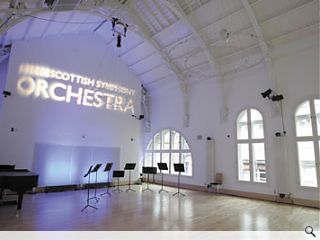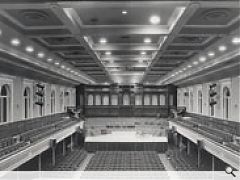City Halls
6 Apr 2006
Glasgow City Council architects have revamped the City Halls. They have opened up the ceiling of the hall and restored many of the original features and given the adjoining spaces, the lobby, the recital room and a new bar have a strong contemporary feel. The team worked closely with Arup Acoustics to ensure the hall provides excellent sound quality for the BBC Orchestra and other users.
My colleague Richard Cowell and I are both ex-students of Strathclyde University. Richard studied architecture in the late Sixties; I was a civil engineering student in the mid-Nineties. I was the only student to have acoustics as a final-year project and I had to persuade the mechanical engineering department to support my ambitions. Back in 1969, Richard was already tackling a design study for the development of Glasgow City Halls and the Old Fruitmarket as a final-year project for his training as an architect. He already knew that his career was moving towards acoustic design, but the site and the virtual project seemed to him to offer special potential.
In 2002, after a long career in acoustic design, Richard was leading Arup Acoustics. So it was a happy coincidence to find that, 33 years later, we were commissioned to provide acoustic consultancy for the new Glasgow City Halls and Old Fruitmarket renovation. Among post-war auditoria in Glasgow the City Hall main auditorium had had a good reputation for its acoustic, despite the room volume being lower than ideal.
Thanks to the determination of Glasgow Cultural Enterprises in the city council, the strong interest and vision of BBC Scotland, and the special energy of Kerr Robertson, the lead architect, the opportunity to recreate the halls was realised. The acoustic design strategy has kept the very best of the positive ‘shoebox’ geometry of the hall. However, the room volume has been increased in two ways; by setting the stalls seating in a sunken volume to achieve a modest seating rake and by opening up the roof void to include it within the volume of the hall. This also allowed us to improve scope for technical service to the performances.
The range of high-quality sound has been extended by limiting the loudness for the larger-scale events. This produces more generosity of aural space for more powerful performances, before the sound becomes aggressive.
We have stiffened surfaces at low level to improve the bass response of the hall.
Some drapes can be deployed at the front and/or rear of the hall and in the roof space to allow adjustment of the acoustic to accommodate a wide range of rehearsal, recording and performance genres.
We spent a lot of effort on the elimination of building services noise from the hall. This greatly enhances the drama and impact of musical performances.
Simple acoustic reflectors over the platform have been adjusted to improve string tone and evenness of distribution from the orchestral performance. We are learning with the performers’ and listeners’ experiences, to assess any need for any further adjustments.
The project includes a recital hall, a high-quality recording, rehearsal and practice space for the BBC and a centre of education.
The adjacent Old Fruitmarket has been refurbished to accommodate new air handling devices and enhanced to keep the best of the fabulous cast-iron structure and galleries. The development of Celtic Connections programmes leads to a wide range of activity within the new Old Fruitmarket venue.
This site is now so crammed with potential that it is a joy to see. On top of this, the first reactions to the sound in the City Halls have been wonderfully positive. Although it is early days, there is every sign that the investment in this newly renovated powerhouse for culture in Glasgow will be fantastic value.
Feed this new strength into the larger mix of cultural facilities in Glasgow, and here is opportunity for even wider cultural impact from this special city. Richard told me recently that successful results at the City Halls provide special fulfilment for him. “From student to enabled and lucky acoustician could not be better illustrated.” The success is special for us all at Arup Acoustics. The Glasgow City Hall is a jewel, which I am sure will become an internationally renowned venue in the next decade. More importantly, if Glasgow and BBC Scotland can make this an engine room of musical influence, there is a wider and wider horizon for our satisfaction.
Seb Jouan is the office leader of Arup Acoustics Scotland. Richard Cowell is a director of Ove Arup
& Partners and formerly a founding member and director of Arup Acoustics.
Read next: Simple geometry
Read previous: Perth Concert Hall
Back to April 2006
Browse Features Archive
Search
News
For more news from the industry visit our News section.
Features & Reports
For more information from the industry visit our Features & Reports section.




